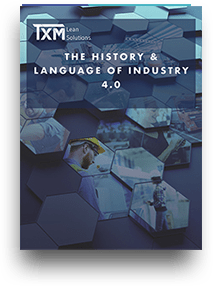Here is an overview of what Industry 4.0 is, how it fits into Lean, how it’s changing manufacturing, what’s the main applications and some emerging industry 4.0 technologies.
If you are new to this term and exploring your options, we’ve broken down this article into 5 parts which you can jump right into after clicking on the links below:
- Lean Industry 4.0
- TXM and Lean Industry 4.0
- How Industry 4.0 is changing manufacturing?
- What are the main applications of Industry 4.0?
- Emerging Industry 4.0 Technologies
What is Industry 4.0
The fourth industrial revolution, also known as Industry 4.0 (i4.0), is disrupting almost every industry worldwide. It is rapidly transforming how businesses operate causing dramatic changes to resourcing, capital and technology investments.
The term Industry 4.0 was coined in 2011 by a group of representatives from different fields by the German Government to enhance the competitiveness of their manufacturing sector. The idea was adopted by the federal German Government as part of their high-tech strategy for 2020.
Industry 4.0 refers to a new phase of the industrial revolution that focuses heavily on interconnectivity, automation, machine learning and real-time data. It has also been referred to as Industrial Internet of Things (IloT) or Smart Manufacturing/Factories.
i4.0 is the marrying of physical production and operations with smart digital technology to create a more holistic and better-connected ecosystem for businesses to focus on manufacturing and supply chain management.
Lean Industry 4.0
Increasingly over the past five years, as Industry 4.0 technology has moved from the R&D laboratory to the factory floor and the office. Businesses have realised that the technology is not enough.
Real competitive advantage is only created when Industry 4.0 technology is married to efficient business processes based on Lean thinking. This is Lean Industry 4.0.
Lean industry 4.0 recognises that operational excellence is only achieved and sustained when people, process and technology support each other.
- New technology that is not surrounded by efficient business processes and effective systems to lead and motivate will just lead to the same results with more investment and more complexity. Simply owning advanced technology does not guarantee that the results delivered will be any better than the obsolete technology it replaces. To get real value from the technology, business processes need to be transformed.
- However, simply implementing the technology with improved business processes will lead to unsustainable results unless culture and leadership is changed. Old behaviours, beliefs and assumptions will act like entropy, drawing the business back to its old ways and old results.
- Many Lean purists will only focus on people and process and not see a role for technology. However, technological change is happening so rapidly now, that even the best Lean organisations can be disrupted and overtaken by newcomers leveraging Industry 4.0 technology.
- Lean Industry 4.0 therefore places the same emphasis on people and process as Lean Thinking, but actively considers the role of technology in eliminating waste and driving improved customer value. By focusing on all three elements, businesses can make the most of innovation and create sustainable competitive advantage.
TXM and Lean Industry 4.0
TXM are leading global operational excellence consultants. We combine decades of practical industrial experience with a deep understanding of Lean and the skills to deliver real sustainable change. Our consultants have learned Lean from some of the world’s leading companies including Toyota, but they also have strong technical backgrounds that provides them with the insights to understand what Industry 4.0 has to offer your business.
We are passionate about customer value and see Lean Industry 4.0 as a vehicle to enable our customers to disrupt their markets by offering levels of service and value their customers never dreamed was possible. As a result, we can help you deliver the potential of Lean Industry 4.0 by delivering the processes and the systems that will enable you to get the maximum leverage out of your investment in technology.
We also have the technical expertise to see the opportunities in your business to apply Industry 4.0 technology to turbocharge your business performance. We are the complete Lean Industry 4.0 solution.
How is Industry 4.0 Changing Manufacturing?
The i4.0 is taking the automation of manufacturing processes to a new level introducing customized, flexible and agile mass production. Equipment and machinery will operate independently or connected to one another. Allowing humans to create a customer-focussed production that works on maintaining itself
Businesses face significant challenges in adapting and implementing these new technologies. A systematic approach is needed to overcome the stumbling blocks of implementing new technologies without proper processes in place.
The connected factories of the future will provide smarter layouts and flows and increasing flexibility of the factory footprint. The comprehensive digitisation of production will enable all production factors to be actively involved in the production process and communicate between each other.
Industry 4.0 will force global manufacturers to new levels of optimization and efficiency. Customers will enjoy new levels of customization in the products they purchase
These technologies are here and doing nothing is not an adequate strategy to stay ahead of the competition. Starting small will help businesses grasp the ideas and technologies of i4.0 and aid understanding of the interconnected future of manufacturing.
What are the Main Applications of Industry 4.0?
Businesses can start applying industry 4.0 in a range of ways varying in cost and complexity. There are major benefits in moving to an industry 4.0 strategy.
Monitoring and Controlling Machinery – Using remote sensors on your machinery to monitor production, identify & correct problems and make informed strategic decisions.
Going paperless – As it suggests, moving to a paperless operation will have save time and money whilst reducing errors whilst being more environmentally friendly.
Introduce Smart Processes – Introduce machines that can analyse their own data and predict when maintenance is needed or advanced control technologies measure quality in real-time during production. This allows analytics to identify the best production and maintenance scenarios.
Experimenting with 3D Printing – Many manufacturers are using 3D printing to rapidly print prototypes, cutting design time down to a fraction of the time it usually takes. 3D printing can fabricate complex forms and create highly customized products tailored to your customers.
Emerging Industry 4.0 Technologies
Industrial revolutions have historically brought about step changes in efficiency globally. Industry 4.0 is no different, with emerging technologies that will make process improvement.
Robotics & Automation – Manufacturers have used robots to tackle complex assignments like car manufacturing for decades where robust, rigid and standardized robots are used to carry out repetitive tasks like installing headlights or interior parts.
Automation is evolving new types of robots to have even greater utility and flexibility. Eventually we will see robots that work side by side helping each other or the humans interacting with them in the factory of the future.
Simulations – This concept is not new but will have an increasing impact on product development and product process design. 3D simulations of product development, material development and production processes will become widespread.
Simulations will be used extensively in operations to leverage real-time data and mirror the physical world as a virtual model including humans, products and machines. Allowing operators to test and optimize machine settings for the next product in the virtual world before the physical changeover, thereby driving down machine setup times and increasing quality.
Horizontal & Vertical System Integration – Horizontal integration means networking between individual machines, equipment or production units. Vertical integration means gaining control of different parts of the supply chain.
An entire organisation will be fused together, and companies will be connected with one another. Industry 4.0 will allow for companies, departments, functions and capabilities to become much more cohesive, creating truly automated value chains.
Industrial Internet of Things – It is seen as the main driver bringing machines, advanced analytics and people together. It is the network of connected devices connected by communications technologies that allow systems to monitor, collect, exchange, analyze and deliver valuable insights.
Embedded computers and sensors allow field devices to communicate and interact with each other. This will improve connectivity, efficiency, save time, improved safety and enable real time responses.
Cybersecurity – The most used Industry 4.0 technology so far would be Cybersecurity. Utilised by most businesses it is made up of technologies, processes and controls to protect the end user, systems, networks and data from cyber-attacks.
Increasing connectivity and the use of standard communication protocols means cybersecurity has never been more important to keep your devices and data safe, especially due to the amount of entry points for a hacker.
Cloud Computing – Cloud Computing is where digital platforms are created and used for accessing, storing and using data. Cloud services are providing real-time information and scalability to support a multitude of devices and sensors along with the data they generate.
Cloud computing is allowing for great collaboration not just internally but across suppliers and distributors. Allowing business to become more agile, launching new products with ever increasing speed.
Additive Manufacturing – Also known as 3D Printing, additive manufacturing has been around for at least 30 years but has evolved into a production process for small batch highly customized products that offer advantages over their traditional counterparts.
Additive Manufacturing is already being used in the Aerospace and Defense Industries creating new designs that reduce aircraft weight.
Augmented Reality (AR) – Currently in their infancy augmented reality-based systems support a variety of services such as selecting parts in a warehouse and viewing pipework underneath construction or roadways. Businesses will use AR to provide workers with real-time information to improve decision making, problem solving and work procedures.
Applications of augmented reality will only be limited by your imagination and budget.
Big Data and Analytics – Data has become more expensive than oil as a commodity and humans have amassed more data in the last few years than the whole of human history. Analytics is being able to bring these datasets together in a meaningful way.
Industry has a wealth of untapped data which can help to optimize production quality, save energy, improve services, allowing real-time decision-making and data driven quality control. Examining large and varied data sets will become the new normal finding hidden patterns, unknown correlations, customer preferences and market trends.
Semi-conductor manufacturers are using big data to decrease product failures by correlating testing phase data at the end of the production line with process data collected earlier, discharging faulty chips earlier in the production process.


